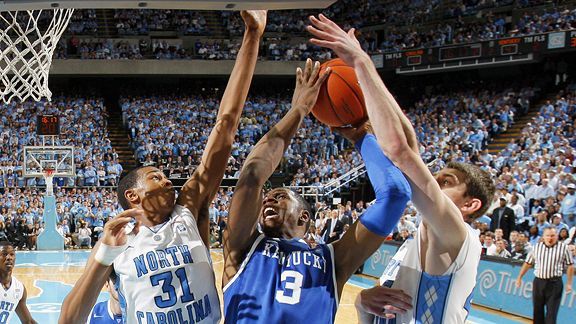Reflections on North Carolina’s Loss to Kentucky
Posted by mpatton on December 5th, 2011The game was terrific. I’ll admit, I didn’t think it would be close. I was sure that one team was going to win by ten, running too quickly for the other to catch up. In fact, when it was 43-35 with a couple minutes left in the first half, I expected the Tar Heels to step on the accelerator and force a couple of freshman turnovers that led to easy transition buckets and go into the half with a ten point lead. [Author’s Note: For the record, I would have expected the exact same thing coming from Kentucky if they had been up eight in the first half.] Needless to say, that didn’t happen.

North Carolina and Kentucky Lived Up to the Hype Saturday.
A few observations that have already been brought up are worth examining more closely. First and foremost, Harrison Barnes was outplayed by Michael Kidd-Gilchrist straight up. No ifs, ands, or buts. That surprised me, especially on the defensive end, where we saw Barnes excel at times last year even when his shot wasn’t falling. Gilchrist was the player of the game, and a lot of his performance won’t show up on a stat sheet. I agree that at least some of Barnes’ struggles came from early foul trouble, but as an experienced player he should have avoided dumb fouls.
One thing that went under the radar is John Calipari‘s effect on the game. Calipari rarely gets credit for outstanding coaching because of his phenomenal recruiting, but he really changed the game with just under seven minutes to play in the first half. At that point, each team had played 26 possessions in 13 minutes. That’s on pace for an 80 possession game — which is breakneck speed. The pace was creating a lot of problems for the Wildcat defense, as North Carolina already had 34 points (good for a ludicrous offensive rating of 130.8). The game ended with only 64 possessions. And it wasn’t because North Carolina wanted to slow down. Calipari and Kentucky effectively slowed the game down, which saw their offensive productivity improve dramatically.
One place North Carolina showed some major question marks was in late-game execution. It’s been covered over and over again that the Tar Heels should have fouled and Marquis Teague traveled. Is that why they lost? No. Would it have given them a very real chance to win if they had? Yes. At worst a foul means there’s five seconds on the clock after Kentucky knocks down two clutch free throws to go up three. At best they get the ball back with five seconds still facing a one-point deficit. Five seconds is an eon in basketball, and North Carolina was shooting very well from the perimeter. That last second mental lapse hurt.
Finally, we get to where the two teams stand. I think Kentucky has more raw talent than anyone in the country. But if you try to tell me after that game that the Wildcats are definitively better than North Carolina right now, I disagree. The game was being played at Rupp Arena. It’s statistically proven that home-court advantage counts for something (be it player comfort, officiating, or something else). North Carolina lost by one point. Regardless, a point here and there is noise. It’s easy to look at that game and say North Carolina shot the ball uncharacteristically well from outside, or that Teague controlled the ball much better than in the past. Kentucky, to its credit, showed real maturity coming back from the modest halftime deficit.
But the fact is that, on Saturday, those teams were evenly matched. That’s why I said North Carolina should still be ranked third (unless you hold an extremely high opinion of Syracuse, which is reasonable). The UNLV loss posed some questions about the team’s intensity. Those questions were at least in part answered by a very strong showing on the road in Lexington.









































